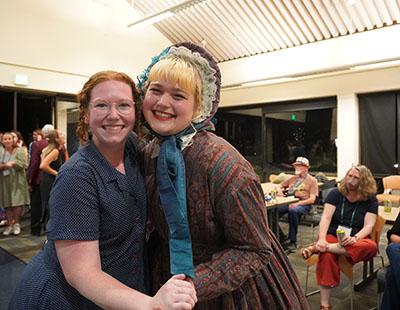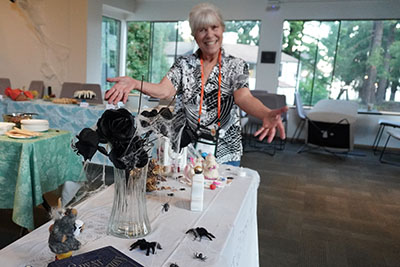Campus News
Dickens Universe 2024: A Spirited Celebration of Great Expectations
This summer, Charles Dickens readers converged on campus for the 43rd annual Dickens Universe, where a shared familiarity with Great Expectations added a sense of kinship and intimacy to the conference. The week was full of lecturers and discussions as well as dancing and a Gothic-themed grand party.


Charles Dickens once referred to David Copperfield as “his favorite child,” the novel he cherished most among his 16 works. However, his widely beloved Great Expectations was a close second in his affections.
The Dickens readers who congregated at UC Santa Cruz from July 21-27 for this year’s Dickens Universe conference share that enthusiasm.
Many conference-goers returned to the book for the Dickens Universe after many repeated readings, said UC Santa Cruz Literature Research Professor and Dickens Project Co-Director John Jordan.
That shared familiarity with Great Expectations added a sense of kinship and intimacy to the proceedings, Jordan said: “The conversations and presentations felt especially personal and reflective this year because this is a book so many people have revisited over time.”
The Dickens Universe, now in its 43rd year, goes far beyond a traditional literary scholarly conference. It also functions as a festival, a book club, and, in the words of New Yorker writer Jill Lepore, a “Dickens camp.’”
The COVID-19 pandemic forced the conference to hold online versions for 2020 and 2021, preserving the Dickens Universe’s intellectual and community spirit while putting some of the joyous analog aspects on hold.
“It feels especially meaningful in the wake of the pandemic lockdown to come together during these Dickens Universe summers to reconnect with people who value the work of the Humanities, to re-read novels like Great Expectations that always feel newly revelatory as the world changes around us, and to discover all the ways our minds and imaginations can expand among the unique and diverse people in the Dickens Universe community,” said Dickens Project Co-Director Renée Fox, Associate Professor in the Literature Department at UC Santa Cruz, where she teaches classes in Victorian Studies, Irish Studies, the gothic, and popular culture.
Founded in 1981 and headquartered at UC Santa Cruz, the Dickens Project, which puts on the Dickens Universe every year, is part of a consortium of over 40 colleges and universities from across the United States and overseas.
The Dickens Project creates opportunities for collaborative research on Dickens and the nineteenth century through annual conferences, institutes, and publications. The Dickens Project also organizes and supports high school outreach programs across the US, provides mentorship for graduate students, and produces curricular material for teaching Victorian literature at both secondary and post-secondary levels.
Savoring a mature work by Charles Dickens
Some of the shared enthusiasm for Great Expectations has to do with this late work’s maturity, with its emphasis on the personal growth and regrets of old age, Fox said.
Some of this year’s Dickens Universe talks, especially those by John Bowen, Professor of Nineteenth-Century Literature at the University of York, and Summer Star, Associate Professor of English at San Francisco State University, approached the novel by examining the way its retrospective narrative confronts the pain and remorse of an older self reflecting on the behaviors, beliefs, snobberies, and desires of youth.
John Jordan, along with Matthew Sussman, Senior Lecturer in English Discipline of English and Writing at the University of Sydney, and Boston College Professor Emerita of English Rosemarie Bodenheimer, focused on the rhetorical strategies Dickens uses to bring humor and deeply felt love and friendship into a novel that is equally rife with loss, disappointment, and uncertain endings.
But the talks also departed from that close focus on human behavior, expanding its scope to discuss the ways the book dramatizes the effects of nineteenth-century colonialism. UC Davis Professor of English Elizabeth Miller spoke of the way the book’s relationships and character “expectations” are embedded in the steam economy and global shipping networks.
Briony Wickes, Lecturer in Nineteenth-Century Literature and Sustainability at Royal Holloway University of London, unpacked the book’s brief references to Australian sheep farming, then segued into a discussion of convict transportation from England to Australia as well as the central importance of sheep to the British settler colonial project in Australia.
The Dickens Universe midweek talks focused on how readers can use Great Expectations as a lens for reimagining our own histories, whether by thinking of the novel as a blueprint for memoir-writing (Mary Mullen, Associate Professor Of English at Villanova University) or by considering what it means to read retrospection in serial forms (Sara Hackenberg, Professor of English, San Francisco State University). Elaine Auyoung, Associate Professor of English at the University of Minnesota, explored ways in which this novel can be taught and discussed in ways that make space for a multiplicity of human experiences.
A chance to dance and mingle
The talks, though, are only a part of what makes the Dickens Universe a special week.
Those who attended the conference enjoyed performances, film screenings, teas, parties, dances, and auctions, as well as seminars and other opportunities for participants to think deeply and talk with one another about their shared experiences with the novel.
This year, for instance, the Dickens Universe welcomed Lura Johnson, Resident Pianist of the Baltimore Symphony and Principal Pianist of the Delaware Symphony, to campus for a Thursday evening piano performance. Lura and Jason Rudy (Professor of English at University of Maryland, College Park), introduced conference-goers to experiments and formal innovations shared by nineteenth-century music and nineteenth-century poetry around the time Great Expectations was published.
“They performed stunning piano pieces by Brahms, Liszt, and Edward MacDowell, ” Fox said.
There were also occasions to hobnob, dance, and eat snacks in Dickens-inspired ways.
“We had a gothic Grand Party, full of cheese and cakes and cobwebby decorations reminiscent of Miss Havisham’s house in the novel, daily Victorian teas organized by wonderful members of our Friends of the Dickens Project Board, and a Friday night Victorian dance where folks aged 18 to 85 came out in their costumes and finery to celebrate the end of the Universe with waltzes and the Sir Roger de Coverley, everyone’s favorite Victorian dance,” Fox said.
Next year the 45th annual Dickens Universe will focus on one of Dickens’s earlier novels, The Old Curiosity Shop, originally published serially in Master Humphrey’s Clock from 1840-1841. This will be only the third time in its history that the Universe has focused on The Old Curiosity Shop, and the last time was more than 20 years ago, so presenters will present new research and topics of discussion. The dates of the Universe are July 20-26, 2025.